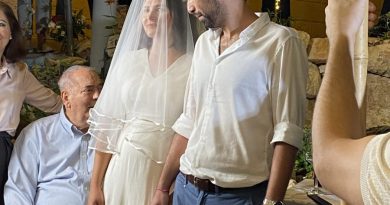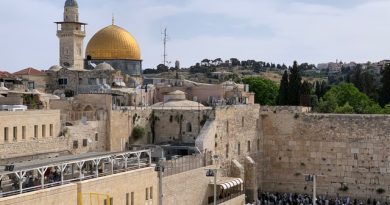This Year in Jerusalem
 Note: This week’s post first appeared at www.israelatsixty.org.il
Note: This week’s post first appeared at www.israelatsixty.org.il
Every year we close our seder with the words “L’shana haba’ah birushalayim,” “next year in Jerusalem.” Unlike the requirement to mention the Passover offering, maror, and matzah this phrase is not found in the Mishnah or even in the Talmud. But the roots of the saying are found in the Mishnah, which is to say from about 1,800 years ago. In Mishnah Pesachim we are told that Rabbi Akiva would conclude his seder with the following: “SO MAY THE LORD OUR GOD AND THE GOD OF OUR FATHER SUFFER US TO REACH OTHER SEASONS AND FESTIVALS WHICH COME TOWARDS US FOR PEACE, REJOICING IN THE REBUILDING OF THY CITY AND GLAD IN THY SERVICE, AND THERE WE WILL PARTAKE OF THE SACRIFICES AND THE PASSOVER-OFFERINGS.” These sentiments are brought into the final bracha of the seder…”and rebuild Jerusalem, the holy city, speedily in our days, and bring us up into it. Let us rejoice in it, and bless you in holiness and purity…” It’s pretty easy to see how we naturally go from that blessing to a call for “next year in Jerusalem!” And I did find a reference to saying “l’shana haba’ah birushalayim” in Minhagim Yisrael, from the early 1600s, so the custom is at least that old.
“Next year in Jerusalem” was clearly a cry from a people living in exile.
Nachat Hashulchan, a Breslav commentary, says “We remind ourselves and affirm that no matter where we find ourselves, no matter how much we’ve prospered individually and as a people – we must never forget that we are still in exile: the Mashiach has not yet come!”
We are in exile – living in foreign lands, waiting to be brought home. Of course, you shouldn’t think that “next year in Jerusalem,” means we have to wait a whole year. One of the previous Lubavitcher rebbes said “The intent is not that we should have to wait until next Pesach for the Redemption. Instead, the Redemption will come immediately, so that next year, when we celebrate the Seder, we will be in Jerusalem.”
For thousands of years, our people have longed to return to this mystical city. Especially in the dark days of pogroms in Eastern Europe, Jews would dream of a better life in the holy city of Jerusalem. Rabbi Shlomo Carlebach beautifully catches this spirit in a teaching on “next year in Jerusalem:” “The Tzanzer rebbe, 150 years ago, had only one good foot. He could only limp about, but when anyone told him, “I’m going to Yerushalayim, the holy city,” as hard as it was for him, he would not only walk him to the door, he would walk behind them down the street and say “give my regards to Yerushalayim, to every house, to every tree, every leaf, every flower, every cloud, every star. Give my regards to the holy wall. Tell Yerushalayim we’re coming. It’s true that we’re limping. We’re broken. We can’t walk fast. But we’re coming.”
When you come to Yerushalayim, your heart is so full, yet so broken. We were the most heartbroken of all after the gas chambers killed 6 million. A million children. With our hearts broken, we went back to the heartbroken city – the only city that can fill our hearts, the city that’s so deep, it keeps our hearts broken while it’s full. It’s so full that your heart has to break, because it’s deeper than you can take.
We Yidden are infinite. That means we are whole and broken, broken and whole. When you walk in the street and see a poor man, you give him five dollars. If you give it to him without being broken because of it, you’ve just given him some green paper. But if it breaks your heart, you’ve given him a new soul – made a poor man whole again.
Can you imagine? From Auschwitz straight to Yerushalayim, and we’re still walking.”
I like his line “when you come to you Yerushalayim, your heart is so full, yet so broken.” It so captures the way I feel. My heart is full, and yet it’s also broken. I sit on my balcony and watch the sunset, watch the lights coming on in East Jerusalem, see the golden Dome of the Rock light up, and I almost have to pinch myself to make sure I’m not dreaming. Here I am, actually living in that place that my ancestors could only dream about, looking at the place where our holy Temple stood. It’s amazing. Yet I only have to shift my glance slightly, and I can see the “security barrier,” which is a massive concrete wall going through Jerusalem, obstructing my view. And breaking my heart. Reminding me that the Messiah has not yet come. Reminding me that I live in a place where some of my neighbors would like to kill me and my children. Is this what we’re praying for when we say “next year in Jerusalem?”
I don’t think so. Jerusalem is really a symbol. In a commentary on the phrase “next year in Jerusalem” Elie Wiesel writes “This article of faith, this song of hope which reverberates from century to century, from country to country, from exile to exile, from massacre to massacre, is restated here tonight. Jews are being murdered again? Next year the killing will stop. Jews are again being starved and persecuted? Next year, the story of the persecution will be told. Always next year. Next year in Jerusalem.”
When I was living in the Diaspora, at this time of year I would often ask myself what does it mean to say “next year in Jerusalem,” when Jerusalem is only an El Al ticket away? This year the question is even tougher. There is a joke which asks “what do Israelis say at the end of the Seder?” The answer: “Next year in California.” Which may be true for a few secular Israelis working in high-tech, but those of us here for religious reasons would not trade Jerusalem for anyplace in the world.
But I have learned that the local custom here in Jerusalem is that we do not end our Seder with “next year in Jerusalem.” We have a little addition. We say “l’shana haba’ah birushalayim hab’nuyah,” “next year in Jerusalem rebuilt.”
Everyone else in the world says “next year in Jerusalem.” We cannot and should not forget our connection to the physical place and the land. But we should also remember that there are two Jerusalem’s – Yerushalayim shel matah, the “lower Jerusalem,” the earthly Jerusalem, the one I live in – and “Yerushalayim shel malah,” the “upper Jerusalem,” the heavenly Jerusalem, the Jerusalem that symbolizes the world at peace, the world of plenty, a world of all mankind living together in harmony, in other ones, the one I dream about. And that’s what we mean when here in Jerusalem we say “next year in Jerusalem rebuilt.” We should live in a Jerusalem without terrorism, without a “security barrier,” and while we’re at it let’s throw in a Jerusalem where all Jews get along together, and where our politicians are honest and competent. Now that would be a miracle!
L’shana haba’ah birushalayim hab’nuyah!


